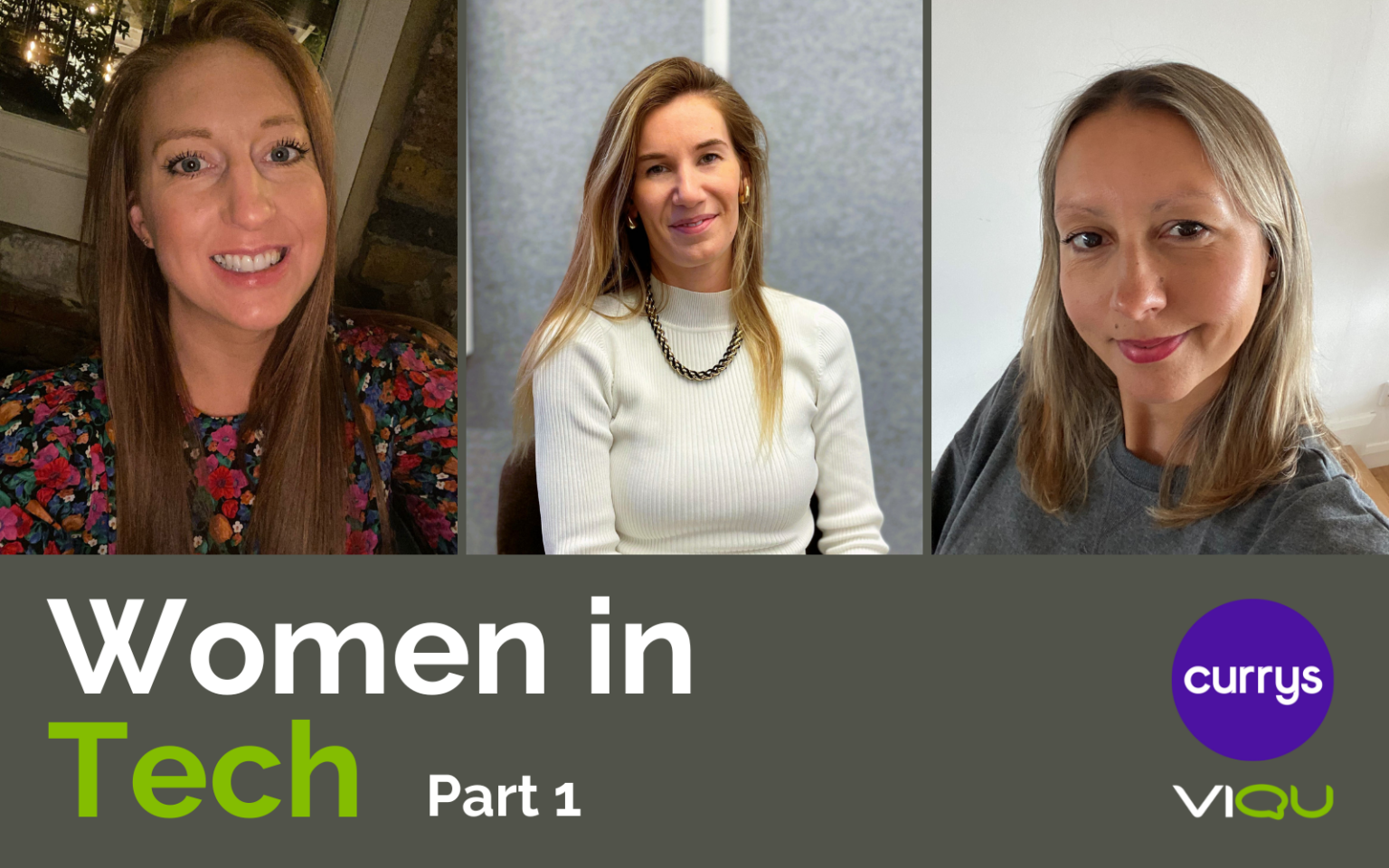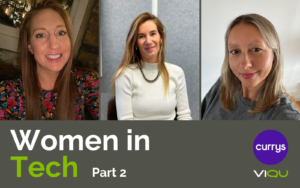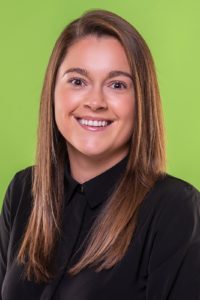Q&A With Currys’ Women In Tech – Part 1

From Left To Right - Philippa Smith, Nia Williams, Diane Spindley
In our latest interview in our Women in Tech series, I had the pleasure of speaking with Philippa Smith, Nia Williams and Diane Spindley – 3 individuals who have risen through the ranks to senior leadership positions in Europe’s leading specialist electrical and telecommunications retailer and service provider, Currys.
In the first half of this two-parter Q&A, we discuss how Philippa, Nia and Diane got started in IT and developed into their current roles, and the ways Currys is contributing to and facilitating a better gender balance in its tech workforce.
What is your current role and core responsibilities at Currys?
Philippa: My current job title is ‘Director of Strategic Change & Portfolio’ for Currys. Essentially, this means overseeing, planning, and managing the transformation roadmap for the business. I look at what our transformation priorities are, plan for them and then play a part in delivering them.
Our delivery is relatively spread out, encompassing myself, our CTO and CDO, but I look after the change management capability, the BA capability and the delivery of all process change projects. My broader responsibilities include overseeing the portfolio across the whole of Currys.
Nia: I’ve been with Currys for over 6 years. I’m currently ‘Head of Strategic Change’ for Currys, which is almost like a two-part role.
I head up the business change capability, where I ensure all our big tech transformations land in the right way.
Then the other half of my role is programme management. I have a delivery capability, where I work alongside a team of lovely programme and project managers who support me with various programmes. I primarily focus on more organisational and strategic elements.
Diane: I am the ‘Head of Delivery for Tech and Enablement’. My position broadly covers infrastructure, so anything data sensor or cloud modernisation-related.
For me, there are two elements to my role. One is focused on BAU, which entails ensuring all our systems and applications are running correctly, that everything is up to date from a software and hardware perspective, and that our data centres are current in terms of technical debt.
And then the other element of my role, which is super exciting, is around transformation. It is different from Nia’s role in that I focus more on Currys’ data centre and infrastructure landscape. Due to multiple companies coming together to form Currys, we have a lot of old legacy technology. So, there are significant opportunities for us to modernise our estate. We’re on a transformation journey to the cloud which is thrilling!
How did you get started in IT?
Diane: It’s crazy to say, but I’ve been working in project management for 20 years, and I’ve been in the tech industry since 2014.
Originally, I worked in the media and entertainment industry in creative operations and studio management. My first role was with Disney within their Fashion and Home team. That was where I learned my project management skillset. I was there for 10 years, and did a variety of great things, including running a creative studio in LA! I then moved from Disney to MTV, but I realised I’d reached the top of the career ladder.
I started to think about how I could grow my career in a different direction. The ecommerce boom was just beginning, which got me interested in learning more about digital technology.
I had a friend who was working for a digital agency, so he facilitated some work experience for me to understand how project management worked in the tech industry. That experience helped me realise I had a lot of transferrable skills. I secured a role with Merlin Entertainment as a Senior Project Manager and that allowed me to fast-track my learning of how technology works and its many applications.
Creative folk and the tech community are not dissimilar. There is quite a lot of synergy between them. So, I found it quite easy to talk with techies in those first few years, and I think it’s that innate curiosity and background that has helped me move into different areas, from ecommerce to applications and infrastructure.
Since joining Currys, I’ve been fortunate that the portfolio has given me many opportunities to do exciting things and swim outside my lane.
Nia: So, I don’t think my path is quite as exciting as Diane’s.
I did a business degree and was keen to go into that kind of arena. Originally, I was very interested in the cosmetics and fashion industry.
I did a couple of placements as part of my degree, and for my final placement, I thought I’d have a little change and I applied to Accenture for one of their internship placements. I was sent to Edinburgh on a very tech-heavy programme, which I really enjoyed. It made me realise that I’m good at rolling my sleeves up and getting the job done, and how programmes/project management mixed with technology allows me to do that.
I went to work for Accenture full-time for a couple of years. I worked on various big client projects across project and change management.
From there I went to a smaller consulting firm but stayed within the telecommunications space. And then I moved to Carphone Warehouse, which became Currys!
Philippa: So, my background is relatively similar to Nia’s in that I also started my career in consulting. I worked in retail for Next and then did some internships in consulting before going into consulting full-time in the retail division of Capgemini and then PWC.
My background has always been in project management and change management, so whilst I wouldn’t really badge myself as a heavy techie, everything I’ve done has always been tech-enabled – whether that’s working on large change projects, revitalising stores, or doing big tech implementations like ERPs.
When I joined Carphone Warehouse / Currys, I was in the transformation team, which sat under finance rather than technology. That was about 9 years ago.
I worked on all kinds of change and project management, and even delivered a £50 million project. That was the point where I was looking for the next step up and decided to leave and go to Virgin Media in a Head of Transformation role. But if I’m honest, it didn’t excite me.
My old boss contacted me about a new Head of Change role at Currys. They had made some changes at the organisation in the time I had been gone and the technology portfolio had been merged and restructured, which gave new exciting challenges and possibilities. So, I obviously came back and that takes us to where I am in my career today.
Have you noticed a lack of women in the technology industry throughout your career and if yes, how has this changed as your career has progressed?
Diane: Project management does tend to be predominantly more women-heavy than other areas of technology. If you meet women working in tech, they tend to sit within project and programme management a lot of the time.
I remember, at Merlin, it was a small team that was quite heavily male-dominated on the infrastructure and application side. But there were a couple of female engineers who were in team lead roles, which was nice. Regardless, I didn’t really notice it if I’m completely honest. I was going in there to learn, and the gender imbalance never impacted me.
However, at points in my career in tech, I have noticed that some men try to flirt with me to get things done. I find those interactions very inappropriate.
I’ve definitely seen a shift with this as I’ve gotten more senior in my career. But I think that’s because people understand that I will talk on a subject and make sure my voice is heard in the room.
I think the rise of women’s networks has been brilliant for seeing the breadth of women who are actually working in technology.
So, there has been a shift in the right direction in my tenure in technology, but in my opinion, it’s too slow. I’m still often the only woman in the room – so it’s nice to be on an all-female call like this as it doesn’t happen very often!
With you both being from a consulting background, have your experiences been different, Philippa and Nia?
Philippa: I never really noticed a lack of women when I was working in consulting, particularly in the retail arena I worked within. Certainly, it was more male-heavy in some technical and engineering teams, but in general, there was a balance.
I think that’s because technology and transformation departments had already merged and were working together as one team in most cases in consulting, and they were probably further ahead in terms of progressive policies.
Nia: I think the consulting sector has always been quite progressive in ensuring equal representation when it comes to recruitment. Unfortunately, as you look at the progression upwards, that’s where an imbalance becomes more noticeable.
You don’t see as many women in managerial and top positions, and I think that’s obviously where businesses need to work on their representation and giving people the right opportunities to grow.
When I joined Carphone Warehouse / Currys, it was quite male-dominated. I was often the only woman in the room.
I know I’m in project and change management which do tend to be female-led areas, but I think generally when I look across technology at Currys, the landscape is beginning to look different, which is great!
Do you think Currys has done anything in particular to facilitate that shift?
Nia: I think it’s lots of different things, to be honest. The ways we’ve approached values and how we’ve positioned our company culture have helped a lot. We now have benefits and policies that support our open and friendly culture, which really appeals to women.
That’s not to say it wasn’t attractive when I first joined the business. But I think through Currys building women’s networks, hosting events and just being much more vocal in certain arenas, it’s become this evolving kind of thing that does now appeal much more. There are still gaps and areas of improvement, but on the whole, I think Currys is doing a brilliant job.
Philippa: There are a couple of additional reasons that I think are contributing to this shift as well.
I think the policies and cultural factors have a big part to play in it. For instance, offering part-time hours and more flexibility appeals to a wide range of people. Pre-Covid, we were very much office-based, with an office location that wasn’t ideal for a lot of people. Now we work on a hybrid basis. There’s a lot more flexibility in terms of hours, which is great for parents, people with elderly parents etc. who can now choose to work four days a week in some cases. I think that’s massively helped us from a cultural perspective.
And then the other area I’ve reflected on is how the organisation has changed since the transformation and tech teams came together. I think that’s broken down some barriers in terms of preconceptions around technology.
But I think it’s also broken down walls in terms of visibility of what tech people are working on. Our CIO now sits on Currys’ EXCO, which means there’s now a direct seat for tech and transformation on our board. This increases visibility and creates greater opportunities.
Thank you for reading the first half of this two-parter Q&A with Philippa, Nia and Diane from Currys. If you would like to continue reading their interview, please click here for part 2.
Similar articles you might like...

In The Age Of Artificial Intelligence, Why Are Businesses Prioritising Female Decision-Makers?
It has been found that employing women in AI teams and leadership positions is strategically important for tech businesses as AI grows in popularity.

Q&A With Currys’ Women In Tech: Part 2
In the final half of this Q&A with Philippa, Nia and Diane from Currys, they discuss what businesses should be doing to attract more women into tech, and the advice they'd give to individuals looking to explore careers in technology.
Latest jobs
Data Product Manager
 London, United Kingdom
London, United Kingdom
 £90k - 100k per year
£90k - 100k per year
Senior Data Product Manager– London/ Hybrid £90,000 to £100,000VIQU have partnered with one of the UK’s leading brands that are currently hiring for a Data & ML Product Lead. Our client is driven to be...
Data Solutions Lead
 Leeds, United Kingdom
Leeds, United Kingdom
 £66k - 75k per year
£66k - 75k per year
Data Solutions Lead Leeds – Hybrid (1 DPW in office)£66,000 - £75,000 + bonusVIQU has partnered with a leading supply chain company seeking a Data Solutions Lead to bridge the gap between business and technical teams,...
Data Engineering Manager
 Leeds, United Kingdom
Leeds, United Kingdom
 £65k - 70k per year
£65k - 70k per year
Role: Data Engineering ManagerSalary: £65,000- £70,000 per annumLocation: Leeds (One day on site).VIQU have partnered with a leading supply chain organisation who are looking to expand their data teams. The Data Engineering Manager will manage...
Site Technician
 Stone, United Kingdom
Stone, United Kingdom
 £0 per year
£0 per year
Job Title: Site Technician Location: Stone (on-site)- must have full UK Driving License. Salary: market- relatedVIQU has partnered with a top engineering company seeking a Site Technician to work on onsite control and protection...
Network and Security Specialist
 London, United Kingdom
London, United Kingdom
 Market related
Market related
Network and Security SpecialistLondon – Hybrid (4 days weekly in office)Competitive Salary + Car allowanceVIQU have partnered with a prestigious Fortune 500 company that is looking to hire a Network and Security Specialist. The Network...

